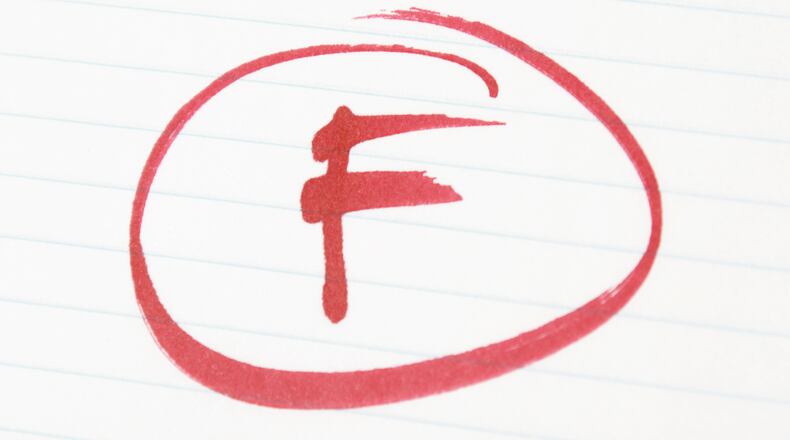As standardized student test scores plunge, some school districts are responding by masking student knowledge deficiencies through equity grading, which is little more than grade inflation dressed up in woke clothing.
There is little doubt that student learning across the country is at a dire level.
On the 2022 National Assessment of Educational Progress, 69% of students taking the eighth grade reading test failed to achieve at or above the proficient level, while 74% of eighth graders failed to score at or above proficient in math.
As their students are failing, school districts in California, New York and other states are implementing equity grading, which eliminates penalties for late assignments, allows students to retake exams and removes misbehavior as a grading factor.
Credit: 190812-A-UG256-010
Credit: 190812-A-UG256-010
Further, ”zeros” for failing to turn in homework and not taking tests are banned and, instead, students are given 50% scores.
Proponents of these changes justify them in the name of equity, which emphasizes the same outcomes for all students, regardless of merit-based factors such as punctuality and effort.
Education consultant and former teacher Joe Feldman, a top equity-grading advocate, claims: “Many traditional grading policies that seem innocuous on the surface can reinforce existing disparities, rewarding students who already have more resources and punishing students who come to the classroom with fewer resources.”
Feldman points to a California school district that implemented equity grading and saw the number of D and F grades fall by almost a third.
However, that result is not evidence of increased student achievement.
The reason that fewer low grades are given under equity-grading practices is because of simple grade inflation, not because students are learning more and performing better.
A recent report on equity grading by the Fordham Institute, an education policy think tank, points out that “‘no zero’ policies and prohibitions on marking down students” cause grades to “inflate automatically.”
Consequently, grade inflation “diminishes standards and expectations” and “distorts signals about student performance,” which cause “students and parents to overestimate students’ knowledge and skills in a certain field.”
Even more troubling than equity grading’s mechanical inflation of grades is its misreading of student psychology.
Feldman says, “Students must fix their errors and give it another try until they succeed, which means we have to offer them that next try.” But if students know that there are no negative repercussions for late or deficient work, then will they do the work at all?
Meredith Coffey, a former teacher and a co-author of the Fordham report, observed: “If students know that they could do nothing and get 50%, why would they work hard? Many would do nothing.”
Classroom teachers confirm Coffey’s prediction.
When Janessa Tamayo, a New York City high school math teacher, switched to equity-grading practices, fewer students did their homework. Also, fewer students participated in class, and many stopped taking tests seriously.
She said: “Grading for equity works fine for the small percentage of kids who are highly motivated. For the rest, it encouraged them to do the minimum.”
Students themselves are often frustrated by equity-grading practices.
One California student said that teachers in his high school “offer retakes on tests, to the point where you could just flunk a first test and you don’t have to study and then you could keep retaking it, and it’s all in the name of equity.”
These practices did not produce students more motivated to learn, as equity-grading proponents have assured. Rather, the California student said, “I’ve noticed kids become more and more detached from the learning process.”
“I used to like school very much when it valued knowledge and excellence,” he said, but “now I’m typically more and more resentful because I love learning and I want to strive for excellence always.”
Indeed, even Feldman admits that there is no evidence that equity grading improves student performance on measures like state tests.
Fordham Institute research director Adam Tyner has noted, “The grading for equity advocates don’t have any research showing that their changes lead to greater learning, and that’s very concerning.”
Ill-prepared students who are not pushed to pursue perfection and avoid mistakes are being set up for failure in the job market.
According to a college math instructor in California, “When you’re a software engineer, you really have to drive toward perfection because every mistake that you make will show at some point and cost the company, so you’re under a lot of stress to be perfect.”
Unfortunately, “if you have an education system that is not encouraging that,” and instead the system easily forgives mistakes, students will collide with reality in high tech because “that is not the way Silicon Valley works.”
Rather than lowering grading standards, schools should implement higher grading practices that push students to try harder.
According to the Fordham Institute report, research “strongly suggests that students learn more when teachers hold them more strictly accountable for their performance in class.” For example, a 2020 American University study “found that high school students assigned to a tougher-grading teacher scored higher in math, both in that teacher’s class and in subsequent math courses, and that was true of all student subgroups.”
Therefore, if educators want to see students of all backgrounds succeed, grading practices should be raised to motivate students to work harder, which will lead to more learning.
Despite its social-justice pretensions, equity grading is just another example of the soft bigotry of low expectations.
Lance Izumi is senior director of the Center for Education at the Pacific Research Institute and author of a forthcoming book, “The Great Classroom Collapse: Teachers, Students, and Parents Expose the Collapse of Learning in America’s Schools.”
About the Author
Keep Reading
The Latest
Featured


